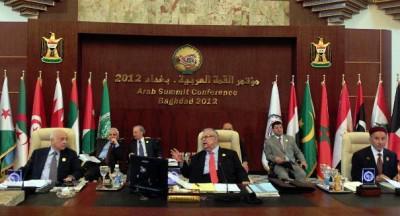
Baghdad hosts its first Arab League summit since 1990. (Photo: Carnegie Endowment)
Last month, leaders from across the Middle East and North Africa were invited to Baghdad for a glitzy three-day Arab League summit meeting, their first in two years. Many of the changes of the Arab Spring were unforeseen, however, and it is becoming very clear what the aspirations of the people are – and that governments across the region can no longer afford to ignore them.
What was most interesting, given the magnitude of what has happened and with the political wrangling that went on behind the scenes, was a missed opportunity to put together an economic plan to help stabilize their respective governments. Instead they produced the “Declaration of Baghdad,” a list of 49 declarations covering everything from adopting a comprehensive vision for political reform for all member states to expressing solidarity and support for the governments of Sudan, Somalia, and the Comoros Islands. However, while some reports suggested that the summit was a failure, there were also positive signs of an agreement as to where these economic reforms should be made.
In the declaration, the Arab League highlighted the role that reforms targeted at small and medium sized enterprises (SMEs) can play in improving the business environment, making Arab industries more desirable for foreign direct investment:
- Declaration 27. Evaluation of actions taken by the Arab League to review the Unified Agreement for the investment of capital in the Arab countries to modify the form, which is consistent with international economic developments, and to emphasize the importance of holding an Arab conference to study the investment climate in Arab countries, and the importance of taking steps that would be given more attention SMEs because of their importance in reducing unemployment in Arab countries. And to provide facilities for Arab businessmen to engage in investment projects in order to achieve common interests and promote intraregional trade among Arab countries.
It also noted the importance of more deeply integrating Arab economies into an Arab Customs Union and an Arab Common Market:
- Declaration 29. Emphasize the importance of integration of Arab economies through free trade and investment and activating the role of the private sector and civil society to contribute actively in the process of comprehensive development in the framework of the Greater Arab Free Trade and move towards the establishment of the Arab Customs Union and leading the Arab Common Market in 2020.
With millions of unemployed youth across the region, real reforms to outdated trade barriers, crumbling infrastructure, and a weak private sector are a few places where governments can start if politicians hope to remain legitimate. Including the private sector in these reforms will also help to incentivize foreign direct investment. This will provide jobs and economic security in the short term, and more efficient and market-friendly trade networks with fellow Arab League members in the long term.
Lowering barriers to entry, reducing tariffs, and creating favorable conditions for entrepreneurship are some reforms to the business environment that all member states can make. According to a recent report, The Economics of the Arab Spring, published by Oxford University, “the private sector in the MENA region is notable for its limited export presence. Overall, the region holds less than one percent of the world market share in non-fuel exports — compared to 10 percent in East Asia, and 4 percent in Latin America.”
Recently, the Tunisian government released its “Jasmine Plan” to rebuild the country’s economy. The plan, which focuses on three central themes: 1) political reform, 2) carrying out the democratic transition, 3) setting conditions for sustained social and economic development in the medium term, could form a model for other members of the Arab League. Highlighting the role that the private sector can play in reforms, the economic plan cites the importance of making much-needed reforms to improve the business environment and support SMEs.

